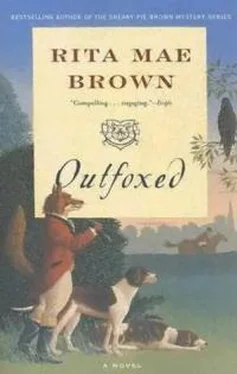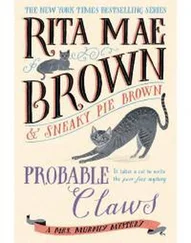About one hundred yards from that point, Patsy was to lead the field back to Sister’s house. The interesting part about this section of the run was that hounds and horses would have been moving along, in some places at speed, for a good five miles. That ought to separate the wheat from the chaff. But this section would test the intelligence of the hounds. They’d be charged up. They’d lose the scent. Uncle Yancy had asked a skunk friend to spray about ten yards from his fence post entrance. That would confuse hounds. Skunk scent would cover fox scent and just about any other scent. So the hounds would need to cast themselves, searching for the line. Even if a few managed to push through the stinging skunk scent to the fence post entrance, they couldn’t do much about it. Digging wouldn’t bring them much, plus the entrance would be covered in skunk scent, too. Yancy made sure of that.
It might take the pack ten to fifteen minutes to pick up the new line thanks to the little traps he had laid for them. This would be quite a test. It would help him understand how good the pack was this year. After all, even though Americans no longer hunted to kill, a fox couldn’t be too careful and the American foxhound was blindingly fast, much faster than the English foxhound. What if Shaker blew them back and the hounds didn’t return to him? That damned young hound chasing Target got his comeuppance but what if he’d been on one of the young foxes? They might not have been so clever. It was one thing to be born bright; experience still counted for much.
He was pleased with the battle plan that they’d all worked on. It would thin out the ranks of all the creatures, especially the humans.
He expected many a good laugh as the woods and fields became littered with humans taking an involuntary dismount.
Patsy, a bright red, would show herself at Sister’s front door and then disappear. A large earth had been dug under Sister’s front porch. Even if the hounds could get under the porch, they’d wreck the boxwoods and Shaker would have to call them off.
The reds, for years, had been digging earths all around the house and the outbuildings and down by the strong running creek at the bottom of the back field.
They liked to observe the hounds and the staff. One needed to study one’s quarry.
Over at Butch’s den, the whole family had gathered.
“Why did you agree to that? Why give the reds all the fun?” Comet was furious.
“I said we wouldn’t interfere with their program.” Butch licked his front paw. “I didn’t say we couldn’t go out and watch. Besides, there’s a whole hunt season before us. Who knows, we might need Target’s cooperation.”
“Let the reds do all the work. We can learn this pack from them,” their mother advised.
“But you’ve known this hunt forever,” Comet whined. “What’s to learn? We should be out there.”
“Box of rocks.” Butch cuffed his son. “Hounds grow old and die. Young ones take their place. The pack changes like seasons. Sister Jane can breed for more speed, too. And never underestimate a hound. They’re intelligent. Not as intelligent as we are but intelligent. Climb a tree where the coop is, the smashed coop. You can see the pack coming from the cornfield across the pastures over the coop and into the woods. We’ll find out how fast they find, if Cora is still the strike hound and if Archie is still the anchor.”
“You go. I’m going to Netty’s den,” he mouthed off. “Let’s see how they work in water but if I feel like it, maybe I’ll just mislead all of them.”
“You do and you’ll be one dead fox,” Buster spat. “Not only will the reds not help you if needs be, I won’t either.”
“The reds are a bunch of snots.”
“Hey, I didn’t say I liked them. But there are times when we need one another. You do as I say!”
Inky, silent, would do as her father told her. She was anxious to see how Diana did on her big day. She hoped her friend would be impressive because she’d heard that hounds could get drafted out. They weren’t always bad hounds but they didn’t fit in with that pack. She liked Diana and was very grateful for the hound’s help. She didn’t tell anyone. She knew better.
The grays left their den, the distance to the cornfield and pasture being about a mile and a half.
“Dad,” Inky whispered as they reached a large rock outcropping, “when’s the last time a fox died?”
“Hunting?”
“Uh-huh.”
“Six years ago an old red, Herschel, got shingles. Gave the hounds a heck of a chase and then when he reached his den he sat on the outside of it. He knew he had to die, you see, so he chose a swift death. He was a brave fox, Herschel, and he didn’t deserve to get shingles. For a red, I liked him fine.”
A huge shape overhead startled them, so silent was the approach. Athena, the two-foot owl, was returning to her nest after a successful night.
“You’ll miss opening hunt,” Comet called up to her.
She circled them and said in a low chortle, “To ride well is the mark of a gentleman. To ride too well is the mark of a misspent life.” Then she vanished as silently as she’d appeared.
CHAPTER 35
Raleigh and Golly sat side by side at the kitchen window. Hounds, sterns up, eyes bright, walked behind Shaker. Doug, riding Rickyroo, walked in front of the hounds at a leisurely pace. Betty Franklin and Outlaw took the left flank. Cody took the right. Jennifer, a good rider, rode with her father, which pleased him.
As they rode off, light streaming in from the east, Golly said, “I’m glad I’m not a pack animal.”
“Me, too,” came the dry reply.
Golly, sitting on the window ledge and therefore eye to eye with the handsome Doberman, replied by curling her upper lip and emitting the smallest of hisses. Raleigh just laughed.
An old farm road snaked up to the top of Hangman’s Ridge. The pack reached this ten minutes after leaving the kennels. At the foot of the ridge, in the flat meadow once used for growing soybeans, trailers were bumper to bumper. People came from neighboring hunts wearing the individual colors of their hunts. Each rider from another hunt had called Sister to request permission to wear their hunt’s distinctive colors. Sister always gave that permission although some masters did not. In that case riders had to wear black coats and boots with no cuffs.
People came to follow on foot. It was going to be a big day thanks in part to the gorgeous weather—good for humans, not so good for scent.
As Sister rode by, men tipped their caps, top hats, and derbies. Ladies called out, “Good morning, Master,” as was proper. Ground followers also doffed their hats or waved. Lisa Bredell, Tinsley Wetherford Papandros, Isabel Rogers all mingled around, dying to find something to bitch and moan about. Each woman wore the perfect outdoor ensemble. Peter Wheeler sat on his truck like an elderly, beloved pasha holding court. When the hunt climbed the ridge his best friend, Granby Vann, a distant relative of Georgia Vann’s, hunting in a frock today, would drive Peter up. From the vantage point of the ridge they would be able to see much of the hunt. Most of the foot followers would stay high also.
Each horse, braided, hooves painted, tail plaited, felt the excitement. Their coats, especially the chestnuts’, caught the morning light, a thousand copper sparkles, whereas the dark grays gleamed like black diamonds. Dappled grays, flea-bitten grays, light grays, almost white, vied with blood bays, light bays, seal browns, and a few paints as to who was the best-looking horse that morning.
Читать дальше












